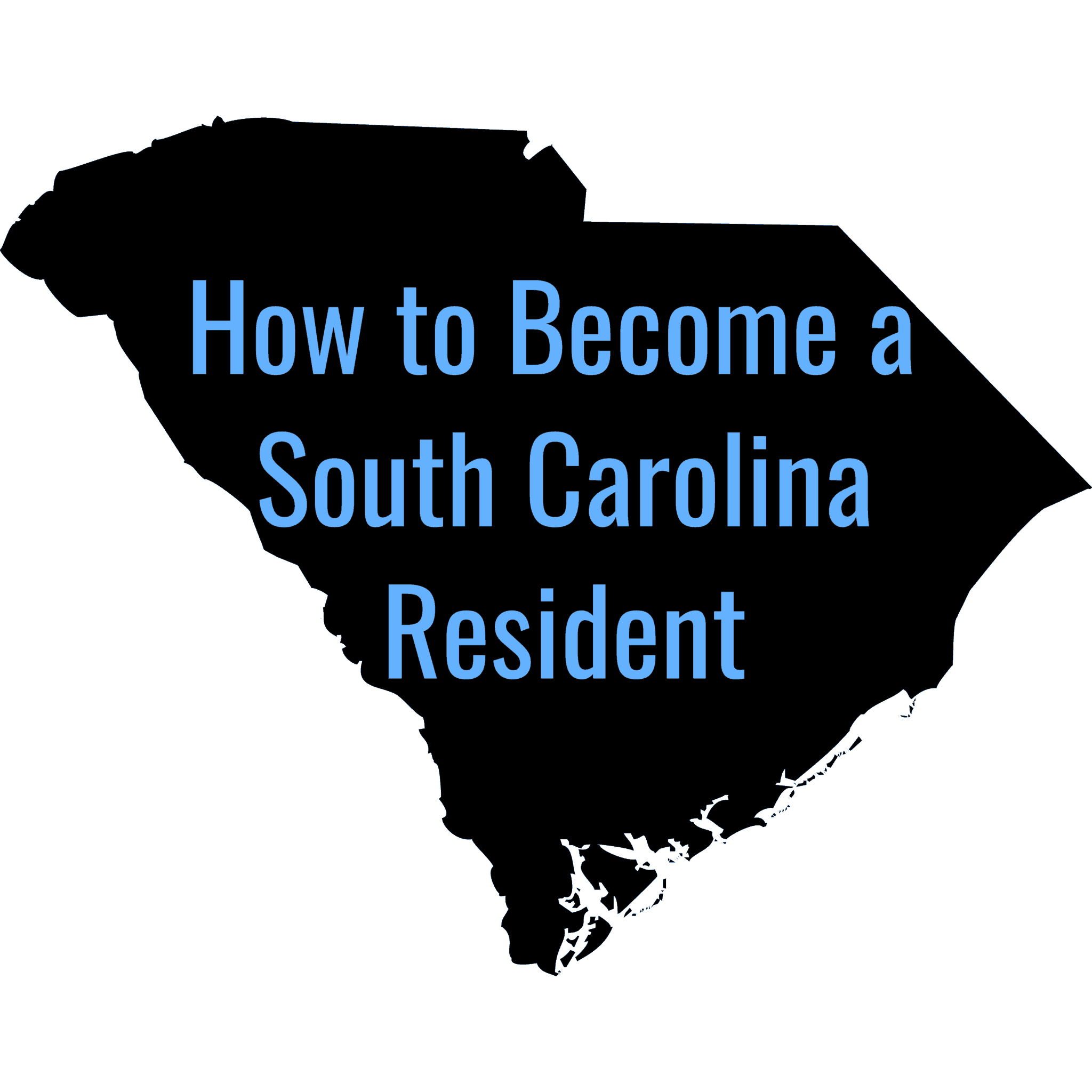If you’re living, working and/or attending school in South Carolina, why not reap the benefits of becoming a South Carolina resident? Residents can file their taxes in SC, which has lower tax rates than many other states– which means you keep more of what you make. Plus, if you’re a student, becoming a resident means paying in-state tuition, which can save you thousands of dollars on your education. In this guide, we’ll cover how to become an SC resident, and specifically talk about how to establish residency as a student, or a taxpayer.
When Can I Declare Residency in South Carolina?
For students to
declare in-state residency, they must live in South Carolina full time for 12 months before beginning the residency process. Those seeking South Carolina resident status for tax purposes must “prove” their residency through time spent in-state, and documentation (like an SC license and registration), as multiple states may try to “claim” your residency.
Establishing Your South Carolina Residency: Step-by-Step

Step 1: Declare Your Intent to Become a South Carolina Resident
Declaring your intent takes a bit more than having South Carolina pride. In the most literal sense, you “declare” your intent by submitting your residency application. But establishing your residency and your intent also refers to the process of establishing your residency through documentation that supports your claim as an SC resident. Examples of intent-supporting documentation include:
- Statement of full-time employment by a South Carolina-based firm. (This could be a letter from your employer, your tax documents, pay stubs or W2).
- Having an SC driver’s license or other state-issued ID.
- Make sure you get this ASAP. If you don’t obtain an SC ID within 90 days of establishing intent, it can push back your timeline for eligibility.
- Having an SC registration for your vehicle.
- This must be obtained within 45 days of your application, or it might delay your eligibility as well.
- Maintenance of a South Carolina domicile*.
- Filing a South Carolina tax return in the year of or prior to your application.
- Licensing for professional practice in SC.
NOTE: Having just one of these documents might not be enough to support your claim. For example, if you work full-time for an SC employer, but don’t have a domicile, it’s unlikely that you’ll be able to claim residency in SC.
*The
State of South Carolina defines domicile as: “A person’s true, fixed, principal residence and place of habitation; it shall indicate the place where such person intends to remain, and to which such person expects to return upon leaving without establishing a new domicile in another state.”
Step 2: Make Sure You Meet South Carolina Residency Requirements
South Carolina delineates residency applications into sections for independent and dependent persons. An independent person is essentially someone who can “claim” themselves (the same way you do on taxes), and is responsible for 50% or more of their living expenses and fees. Before you apply for residency, it’s important to make sure you meet
ALL the requirements as either an independent or dependent resident.
For the purpose of the list below, let’s focus on residency for students, specifically. Independent students are required to:
- Have a place to live for 12 months prior to your application.
- NOTE: Dorms or university housing does not count towards your residency, as these are considered “temporary” by the State of South Carolina.
- Have an SC license and SC registration for any owner or leased vehicles under your name (the same time restrictions apply as above).
- For all applicants: If you want to establish an independent residency, your parents cannot claim you as a dependent on their taxes, regardless of where they live. You will need to claim yourself and file SC taxes at the appropriate time.
- For applicants under 24: You must prove that you covered at least 50% of all tuition, fees and living expenses AND prove that you will continue to be able to cover at least 50% of your expenses on an ongoing basis.
- Gifts and scholarships do not count towards the 50% coverage.
If you are filing as a dependent resident in South Carolina, the basic requirements are as follows:
- Your parent or legal guardian must have a place to live for 12 months before you apply.
- Living with a non-guardian extended family member does not count.
- Your parent must have an SC license and vehicle registration (same restrictions as above).
- Your parent or guardian must claim you as a dependent on their South Carolina taxes.
- Divorced parents that have joint custody or full custody through a divorce decree do not have to claim you on their federal taxes. Children of divorced parents will have to prove that they spend at least 50% of their time in the SC resident if one parent resides out-of-state.
Step 3: Fill Out a South Carolina Residency Application

For students: Your college or
university will usually have its own application, which you can find at the registrar or financial aid offices. This is also where you’ll find the experts in residency, who can help if you have any specific questions about becoming an SC resident.
Depending on your field of study, there may be additional tuition-reduction programs that allow you to establish residency, like the
Academic Common Market or the
Southern Regional Education Board (SREB) Regional Contract Program.
For Taxpayers: After declaring your intent through the documentation we discussed above, you can simply submit your
state income taxes for South Carolina to establish your residency. If multiple states may be able to claim your residency, be sure to talk with a CPA or legal professional to learn how you should proceed.
Step 4: Be Patient
Residency applications can take 6-12 weeks for processing and approval. Take this into account and try to submit your application as early as possible, especially if you are applying for additional financial aid or loans that require in-state residency at a certain time. Ask your college or university about their standard timeline for approvals, and if you haven’t heard back in a reasonable period of time, call your financial aid or registrar office to check in.
Step 5: Throw Yourself a Party: You Did It!
Once your residency status has been approved, it’s time to celebrate! Now that you’re an SC resident, you’ll be able to benefit from a variety of state programs, as well as our state’s low tax rates. Take a moment and raise a glass. Becoming a resident is a long and arduous process, but you did it!
South Carolina Residency Exceptions and Special Cases

Whether you’re establishing residency as a student, or for tax purposes, there are always exceptions to the rule. If you are an immigrant in the United States or are a military member, your process for establishing residency may be a bit different from the standard.
- Immigrants: South Carolina is proud to be a welcoming state for many international students and workers. To be eligible for in-state tuition in South Carolina, immigrants must be a permanent resident of SC, with a valid permanent resident car. They must also meet all the requirements for SC residency above.
- Military Members: If you’re an active military member who’s been assigned to South Carolina permanently, you may be able to establish your residency without establishing a domicile. Be sure to submit your military ID number, any relevant military order forms and the DEERS form if applicable.
Conclusion
Again, congratulations, and welcome to your new home state! South Carolina is an incredible place to live, full of friendly folks, amazing cities and the unique natural beauty that comes with a state nestled between the ocean and the mountains. Whether you’re only here for a few years or plan to be a resident forever, make sure to experience everything SC has to offer.
Need help moving into your newly established residence?
HD Auston Moving Systems has over 7 decades of experience helping people move in South Carolina, so we have the knowledge and experience you need for a stress-free move. Call us today for more information!

 For students: Your college or university will usually have its own application, which you can find at the registrar or financial aid offices. This is also where you’ll find the experts in residency, who can help if you have any specific questions about becoming an SC resident.
Depending on your field of study, there may be additional tuition-reduction programs that allow you to establish residency, like the Academic Common Market or the Southern Regional Education Board (SREB) Regional Contract Program.
For Taxpayers: After declaring your intent through the documentation we discussed above, you can simply submit your state income taxes for South Carolina to establish your residency. If multiple states may be able to claim your residency, be sure to talk with a CPA or legal professional to learn how you should proceed.
For students: Your college or university will usually have its own application, which you can find at the registrar or financial aid offices. This is also where you’ll find the experts in residency, who can help if you have any specific questions about becoming an SC resident.
Depending on your field of study, there may be additional tuition-reduction programs that allow you to establish residency, like the Academic Common Market or the Southern Regional Education Board (SREB) Regional Contract Program.
For Taxpayers: After declaring your intent through the documentation we discussed above, you can simply submit your state income taxes for South Carolina to establish your residency. If multiple states may be able to claim your residency, be sure to talk with a CPA or legal professional to learn how you should proceed.
 Whether you’re establishing residency as a student, or for tax purposes, there are always exceptions to the rule. If you are an immigrant in the United States or are a military member, your process for establishing residency may be a bit different from the standard.
Whether you’re establishing residency as a student, or for tax purposes, there are always exceptions to the rule. If you are an immigrant in the United States or are a military member, your process for establishing residency may be a bit different from the standard.

